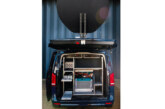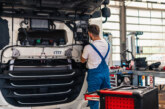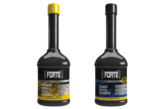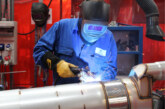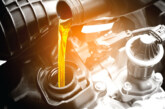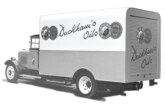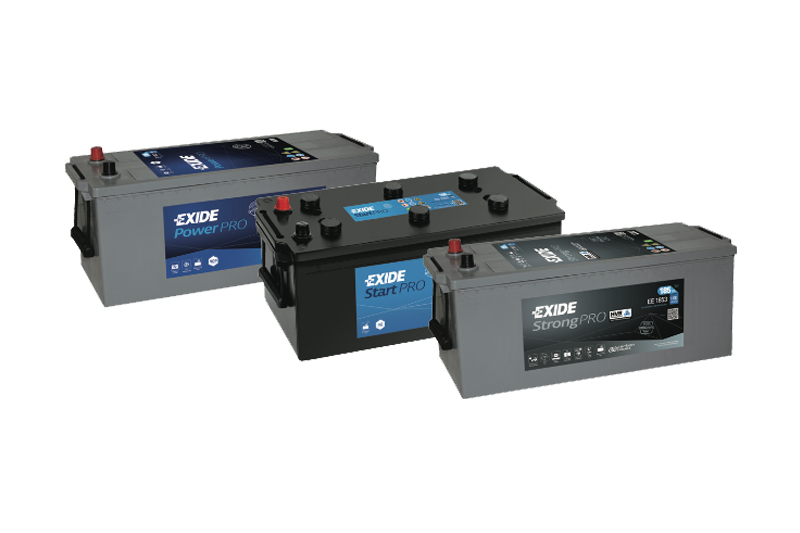
It is vital to make the right choice for the conditions. ECOBAT explains the three most important considerations when it comes to batteries.
Efficient supply logistics are more important than ever, with customers expecting faster and more predictable deliveries; which is why, in this competitive environment, fleet owners should be focused on the total cost of ownership. This is because, anytime a CV is off the road due to breakdown, it not only leads to customer dissatisfaction, but extra overheads for its recovery and repair, as well as potential fines or penalties.
It is vital to make the right choice for the conditions of use when it comes to a battery. The three most important considerations when selecting the most appropriate solution are vibration resistance, cyclic endurance, and cranking power.
Vibration resistance – For CVs with rear chassis mounted battery installations (e.g. Euro V/ Euro VI vehicles), robust and high-vibration-resistant batteries are required to avoid breakdowns. Vibration resistance is also required for any vehicle operating on poor quality road surfaces or rough terrain.
Cyclic endurance – High cyclic endurance (charge, discharge, charge) is particularly important for batteries in long-distance vehicles where drivers live on-board for days at a time or for those doing intensive urban deliveries or with extensive energy requirements. A high level of cyclic endurance maximises lifespan on the battery and ensures it is able to deliver multiple engine starts.
Cranking power – High cranking power allows for dependable engine starts in cold climates and is a requirement for many power-intensive vehicles.
The new Exide StrongPRO features a high vibration-resistant design, and comes with Carbon Boost, the company’s smart solution for reduced acid stratification and faster recharge.
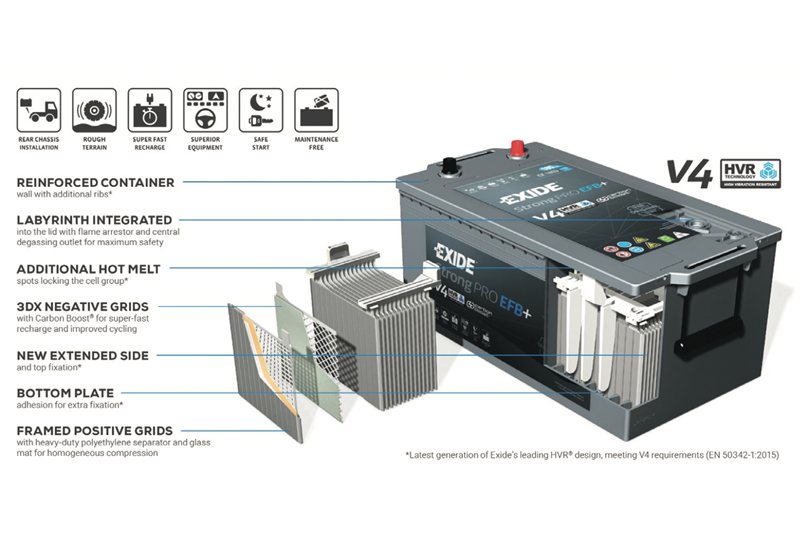
Since AdBlue (diesel exhaust fluid) systems were introduced with Euro V/VI engines, CV manufacturers have moved the battery to the rear of the chassis, where increased vibrations can cause early battery failures. Exide’s HVR technology prevents this, and enables StrongPRO to pass the extreme vibration tests under the new European V4 standard (EN 50342-1:2015).
Using StrongPRO, therefore, means less risk of breakdowns, greater starting reliability, and a longer lifespan, thus providing fleets the lowest total cost of ownership for their vehicles. As a leading OE manufacturer, working with numerous truck manufacturers and agricultural brands, Exide brings this latest technology straight to the aftermarket.
Early CV battery failure, caused by exposure to deep discharge conditions, is common with vehicles having to cope with challenges such as frequent starting and stopping for the urban delivery environment, as well as having to deal with the demands of overnight heating and lighting required for long-distance logistics providers. This strain can lead to sulphation and acid stratification, affecting battery lifespan.
Avoiding sulphation
With Carbon Boost, Exide’s smart electrochemical solution for longer battery life, unique carbon additives on the surface of the negative plates increase the speed at which sulphate particles dissolve. This leads to faster recharging, as well as protection from sulphation, and less acid stratification.
Sulphation occurs as sulphate particles progressively cover the negative plates, which makes recharging less efficient because energy is used to dissolve it. However, acid stratification arises when the sulphate particles turn into sulphuric acid during charging. This is heavier than the electrolyte, so sinks to the bottom, which has an adverse effect on the battery’s ability to charge, as it can’t charge in concentrated acid and is less efficient in the dilute.
In addition, the concentration of acid will cause the lead plates to sulphate from the bottom, commonly known as bottom plate sulphation, and become brittle, which left unchecked, will result in the battery losing a third of its capacity in as little as six months.


